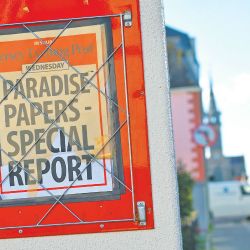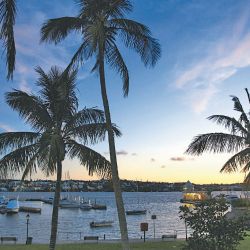A year and a half on from the Panama Papers tsunami, the secrets of the offshore world have once again been exposed for all to see.
The Paradise Papers are another blow to the privileges enjoyed by the club of the rich and powerful that use tax havens and one of the world’s premier law firms. Multinationals, political leaders and celebrities have been put in the spotlight over the last week after the publication of a massive trove of documents obtained the German newspaper Süddeutsche Zeitung, which were shared by the International Consortium of Investigative Journalists (ICIJ) with media outlets in 67 countries, among them Perfil. Once again, Argentina finds its citizens in leaked files.
At least two of President Mauricio Macri’s ministers, Luis Caputo and Juan José Aranguren, as well as local business leaders and politically engaged persons are part of the select group that have been named in the revelations.
Tax evasion, money-laundering and corruption are three diseases that reproduce at speed when secret or opaque jurisdictions provide services of financial secrecy. Behind them there’s another multi-million dollar business and a group of crucial actors: the banks and the financial entities that benefit from these structures.
The Paradise Papers are based on 13.4 million documents, the majority of which come from the internal databases of the two firms that provide “offshore” services: Appleby, founded in Bermuda and Asiaciti Trust in Singapore. Seven million of those documents are from Appleby and about half a million are from Asiaciti. In addition, the 382 journalists that worked on the project were able to verify the commercial records of 19 opaque jurisdictions like Antigua and Barbuda, Aruba, Bahamas, Barbados, Bermuda, the Cayman Islands and Malta.
The documents reveal how assets and large amounts of money have been moved around, beyond the reach of tax authorities. The firms that have been involved create complex business structures in order to hide the real beneficiaries of the assets, optimise their tax status or even evade paying taxes altogether. They do so primarily by way of companies, trusts, and private foundations. In the offshore world the rules are the same for those who have licit objectives as well as those who use them to accumulate and hide their wealth, evade taxes or launder money. They can be used to buy stocks, real estate, fine art or redirect the profits of a company or an individual. One of the most common methods is to open bank accounts in other countries in the name of these firms. The final beneficiaries can hide their identity and thus avoid paying taxes.
The Cayman Islands is one of the most exposed jurisdictions in the Paradise Papers. The islands are a British Overseas Territory and rank fifth in the most recent Financial Secrecy Index, which was published in 2015 by the Tax Justice Network. It is also where Mauricio Macri’s now Finance Minister Luis Caputo managed millions in investments between 2009 and 2015, just before he took office.
CAPUTO
Caputo managed the Alto Global Fund investment fund, which is registered in the Cayman Islands, and he was also the administrator of Noctua Partners LLC, which managed investment funds in Miami with connections to Delaware, the US state considered a corporate haven of financial secrecy and tax benefits. Between 2009 and the day he was sworn into office, in December 2015, Caputo was the “manager” of Alto Global Fund, a hedge fund in the Noctua conglomerate which administered high-risk and high-return investments in emerging markets for more than US$100 million, according to specialised media outlets. To be able to invest in this fund, interested parties had to put up at least US$1 million. The investments were channelled through bonds that were in default.
Contacted by the Argentine team investigating the Paradise Papers, the 52-year-old downplayed the importance of Alto Global Fund. “It was an investment fund for friends and family. Very small, in order to have an institutional vehicle that is more profitable than if an individual goes to a bank, where the rates are less attractive,” he said. However, the Caputo name appears on two Appleby sheets on emerging markets and hedge funds. In another spreadsheet from November 2011, the fund is included in a list among “the most prolific hedge funds.”
The revelation once again puts Mauricio Macri’s government – which is seeking to project a clean image in the fight against money-laundering and financial secrecy – in a situation that is at the very least uncomfortable. Argentina will chair the G20 in 2018, precisely when the alliance of “industrialised and emerging” countries are seeking to take the lead in the fight against tax havens. In 2016 the group’s member nations, including Argentina, agreed to ask the Organisation for Economic Co-operation and Development (OECD) to produce a fresh list of countries that shelter tax evaders and do not cooperate with efforts to punish them. Just last week Buenos Aires hosted the Latin American countries associated with the Financial Action Task Force (FATF), an intergovernmental anti-money-laundering body. Argentina is chairing the global organisation this year.
The case puts Minister Caputo – the cousin of Argentine construction tycoon Nicolás Caputo, a long-time friend and confidant of President Macri — in a complicated situation. The fund that he managed in the Cayman Islands invested in debt bonds that had defaulted. In 2015 Bloomberg and other international media outlets used Caputo as a specialised source of information concerning Argentine debt, consulting him over the tensions that existed at the time between the Kirchnerite government and the so-called ‘vulture funds’. Once in government, Macri asked Caputo to handle one of the most sensitive portfolios in the transition: to negotiate the debt with the holdout creditors. Asked if there was a possible conflict of interest, the minister dismissed the claim. “The first time that I dealt with vulture funds was as a public official. None of the funds that litigated against Argentina was linked to Noctua, I don’t think so,” he said. “I don’t think so,” he repeated again, “but the truth is that I don’t know. If some fund that litigated against Argentina shows up with links to Noctua I’ll eat this phone and throw myself out the window,” he said in conversation with the Argentine team investigating the leak.
Former president Cristina Fernández de Kirchner’s Unidad Ciudadana party has called for Caputo’s resignation. “Luis Caputo dedicated himself to managing offshore partnerships and investment funds in fiscal paradises, and did not inform about that activity in his sworn declaration upon entering public service,“ the party said in a statement.
ARANGUREN
Caputo isn’t the only minister in Macri’s Cabinet now under scrutiny. Energy Minister Juan José Aranguren is another of the Argentines linked to the offshore world detailed in the Paradise Papers. The former Shell CEO was a director of at least two companies registered in offshore jurisdictions. The matter would have been a mere anecdote, were it not for the fact that one of those companies was awarded a contract for the purchase of diesel oil by the current administration.
Between April and September 2003, Aranguren appears in the records as linked to Shell Western Supply and Trading Limited, a subsidiary of Royal Dutch Shell PLC, registered in Barbados.
“It was the company that offered the best price to the state,” said Aranguren with respect to the aforementioned diesel oil contract, which was worth around US$150 million. Contacted by the Argentine Paradise Papers team about the offshore origin of the company that was awarded the public contact, the minister admitted that it was linked to an intention to pay less tax and chalked it up to a common practice among multinationals, in particular, petroleum companies and traders. “Many of them are registered in countries that are characterised by a favourable tax system. We don’t have reason to believe that there are legal obstacles in international trade to operate with companies with those characteristics,” he explained.
Aranguren, 63, also denied that he had any influence in the diesel oil purchase, saying that for any government business that involves Shell he is replaced at the table by Production Minister Francisco Cabrera, further to a ministerial resolution and a presidential decree.
Senator Fernando “Pino” Solanas (Buenos Aires City- Proyecto Sur) doesn’t agree. He filed a complaint this week against Aranguren in the federal courts. According to Solanas, the Energy minister omitted in his sworn statements to declare his previous work with Shell Western Supply and Trading Limited, the Royal Dutch Shell PLC subsidiary. “The minister broke Law 25.188 of public ethics because one of the companies that he was a director of ended up being the primary awardee for the purchase of diesel oil by the current government” reads the brief submitted by Solanas.
José Luis Gioja, the chairman of the Justicialist Party (PJ) and a member of the Energy committee in the Lower House of Congress, has requested that the minister be summoned to Congress to answer questions.
GLENCORE
Some of the most well-known global multinational corporations like Glencore, Apple and Nike also feature prominently in this new ICIJ investigation. The banks are also involved: HSBC, Credit Suisse, Citi Group are just some of the main protagonists behind these revelations. Glencore is one of the giants of the world that hides in these tiny offshore jurisdictions. The multinational, which operates some of the most important mines in Argentina and has interests in the petrol and agricultural business, is one Appleby’s main clients. It is the fourth-largest mining company in the world and the biggest global trader of raw materials. In Latin America,it also has operations in Bolivia, Chile, Colombia and Peru.
The Paradise Papers reveal that Glencore has a hidden network of firms in Bermuda and the Cayman Islands, both of which are tax havens. This network is then used to buy and shell shares, take on debts and operate manoeuvres to avoid paying tax. In Argentina, Glencore has mining projects in Alumbrera (Catamarca) and El Pachón (San Juan). The gold and copper deposits there have generated profits in the millions for companies registered in tax havens. The firm receives tax benefits from the government that include mining royalties of barely three percent of profits, as well as discounts and reimbursements on all kinds of national, provincial and municipal taxes. Glencore is the primary character of the storied pages on mining in the Paradise Papers.
As the revelations came to light this week, responses kicked into gear. Antonio Gustavo Gómez, a federal prosecutor in Tucumán, sought the arrest of the former president of the Universidad Nacional de Tucumán (UNT) and other university officials, who are suspected of involvement in the money-laundering of funds stemming from the La Alumbrera mine.
BUSINESS
Local real-estate developer and businessman Alan Faena has also fallen under the spotlight. According to the leaked documents, he was a director and CEO of half-a-dozen companies created in the tax havens of the Cayman Islands and the British Virgin Islands. The 53-year-old also appears to have had bank accounts in Luxembourg and the Isle of Man, which are linked to various hotel and real-estate projects in the City neighbourhood of Puerto Madero.
Through these of fshore firms he is linked to various international investors such as multi-millionaire Russian Len Blavatnik, US nationals Robert and Christopher Burch of the Redbadge group, Austin Hearst, the director of the media multinational that bears his last name, and designer Philippe Starck. The network of offshore companies in which Faena appears is complex and spans almost two decades, according to the documents in the massive leak.
Brazilian construction giant Odebrecht, in the news for sprawling Lava Jato corruption case, is one of the prime examples of how much offshore businesses set up by one of the most prestigious legal firms can be used to commit transnational crimes – like the payment of bribes.
Odebrecht is an Appleby client, and the firm created 17 offshore companies for the Brazilian firm. Some of them are publicly known for conducting operations for Odebrecht in Africa. For example OSELOdebrecht Servicios en el exterior Ltd was incorporated in the Cayman Islands, despite being based in Maputo, Mozambique.
Odebrecht has previously admitted to paying bribes to public officials in Mozambique to win contracts.
According to the Swiss Attorney General’s Office, which cooperated with Brazilian Lava Jato investigators, this offshore company participated in a triangulation which allowed the transfer of bribes to Petrobras directors. Brazilian investigators have found that offshore firm Smith & Nash Engineering received deposits amounting to US$45.4 million between 2006 and 2011 from four Odebrecht companies – among them OSEL-Odebrecht Servicios en el exterior Ltd. In the same period, that offshore firm is alleged to have paid US$6.8 million into two accounts belonging to Paulo Roberto Costa (a former Petrobras director for refining and supply) in Switzerland.
Smith & Nash was one of the companies Odebrecht executive Fernando Migliaccio even named in his testimony as a state’s witness.
Migliaccio, who ran part of the bribery scheme at Odebrecht, even used Appleby for his own personal investments. Along with another Odebrecht ‘bagman,’ Olivio Rodrigues Junior, they invested in the Af Wealth Preservation Trust, a fund that managed assets for hundreds of people. Both of them have been directly implicated in the payment of bribes in Argentina: Migliaccio ordered them and Olivio participated in the transfers.
The structure behind the lowcost airline business in Argentina also appears in the Paradise Papers. In order to operate in Argentina, Germán Efromovich, the co-founder of Avianca, used a network of offshore companies as collateral for a deal. The Argentine state accepted the use of a Panamanian offshore company that was hiding more than 20 firms registered in tax havens as an economic guarantee when it awarded the airline new flight routes.
Efromovich is linked to a conglomerate of offshore companies that has ramifications in Bermuda, Panama and Cyprus. According to reports in financial media outlets, that network is used for the holding’s air transport activity in the region. The structure established by the businessman work like a set of Russian matryoshka dolls. The offshore that operates in Argentina is controlled by another offshore, which is itself managed by a common investment fund or trust. And so on and so forth. Tracking down the companies, hunting for the true owners, is an arduous task.
When Avianca bought MacAir Jet, the Macri Group’s airplane business, it paid US$10 million through this network. It was that purchase that gave it a foothold in Argentina’s low-cost airline sector. Most recently, it emerged that another businessman, Antonio de la Rúa (the son of former Argentine president Fernando de la Rúa) is also member of the offshore club. He, the documents reveal, was a director of Tournesol Limited, a firm registered in Malta between 2008 and 2011.
The Maltese company belongs to Colombian singer Shakira, his former partner, and it was used to channel earnings of nearly 32 million euros. The company owns another company in Luxembourg, ACE Entertainment S.àr.l, which manages assets and music rights. Unsurprisingly, the money wasnever in Malta at all.
All week, the revelations from the Paradise Papers have made headlines across the world, shining a light on information shrouded in financial secrecy. And who knows how many more secrets still remain inside those 13.4 million documents.




























Comments